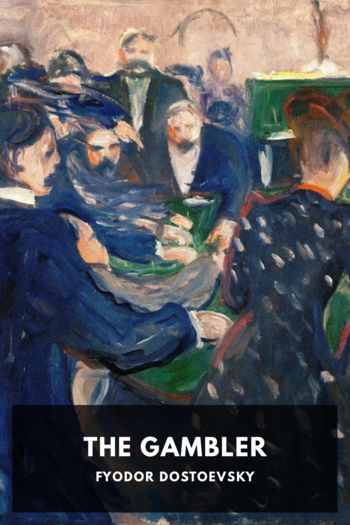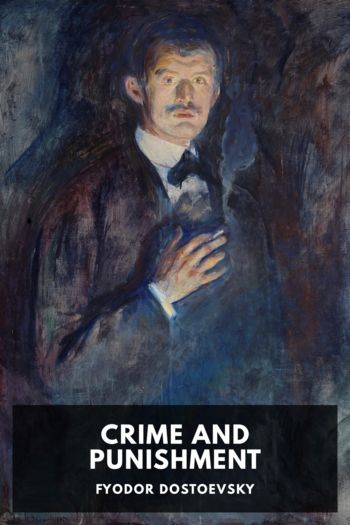Poor Folk by Fyodor Dostoevsky (best fiction books to read .TXT) 📕

- Author: Fyodor Dostoevsky
Book online «Poor Folk by Fyodor Dostoevsky (best fiction books to read .TXT) 📕». Author Fyodor Dostoevsky
Why do I do my official work at all? Why is that necessary? Will my doing of it lead anyone who reads it to give me a greatcoat, or to buy me a new pair of shoes? No, Barbara. Men only read the documents, and then require me to write more. Sometimes a man will hide himself away, and not show his face abroad, for the mere reason that, though he has done nothing to be ashamed of, he dreads the gossip and slandering which are everywhere to be encountered. If his civic and family life have to do with literature, everything will be printed and read and laughed over and discussed; until at length, he hardly dare show his face in the street at all, seeing that he will have been described by report as recognisable through his gait alone! Then, when he has amended his ways, and grown gentler (even though he still continues to be loaded with official work), he will come to be accounted a virtuous, decent citizen who has deserved well of his comrades, rendered obedience to his superiors, wished no one any evil, preserved the fear of God in his heart, and died lamented. Yet would it not be better, instead of letting the poor fellow die, to give him a cloak while yet he is alive—to give it to this same Thedor Thedorovitch (that is to say, to myself)? Yes, ’twere far better if, on hearing the tale of his subordinate’s virtues, the chief of the department were to call the deserving man into his office, and then and there to promote him, and to grant him an increase of salary. Thus vice would be punished, virtue would prevail, and the staff of that department would live in peace together. Here we have an example from everyday, commonplace life. How, therefore, could you bring yourself to send me that book, my beloved? It is a badly conceived work, Barbara, and also unreal, for the reason that in creation such a chinovnik does not exist. No, again I protest against it, little Barbara; again I protest.—Your most humble, devoted servant,
M. D.
July 27th: My Dearest Makar AlexievitchJuly 27th.
My dearest Makar Alexievitch—Your latest conduct and letters had frightened me, and left me thunderstruck and plunged in doubt, until what you have said about Thedor explained the situation. Why despair and go into such frenzies, Makar Alexievitch? Your explanations only partially satisfy me. Perhaps I did wrong to insist upon accepting a good situation when it was offered me, seeing that from my last experience in that way I derived a shock which was anything but a matter for jesting. You say also that your love for me has compelled you to hide yourself in retirement. Now, how much I am indebted to you I realised when you told me that you were spending for my benefit the sum which you are always reported to have laid by at your bankers; but, now that I have learned that you never possessed such a fund, but that, on hearing of my destitute plight, and being moved by it, you decided to spend upon me the whole of your salary—even to forestall it—and when I had fallen ill, actually to sell your clothes—when I learned all this I found myself placed in the harassing position of not knowing how to accept it all, nor what to think of it. Ah, Makar Alexievitch! You ought to have stopped at your first acts of charity—acts inspired by sympathy and the love of kinsfolk, rather than have continued to squander your means upon what was unnecessary. Yes, you have betrayed our friendship, Makar Alexievitch, in that you have not been open with me; and, now that I see that your last coin has been spent upon dresses and bonbons and excursions and books and visits to the theatre for me, I weep bitter tears for my unpardonable improvidence in having accepted these things without giving so much as a thought to your welfare. Yes, all that you have done to give me pleasure has become converted into a source of grief, and left behind it only useless regret. Of late I have remarked that you were looking depressed; and though I felt fearful that something unfortunate was impending, what has happened would otherwise never have entered my head. To think that your better sense should so play you false, Makar Alexievitch! What will people think of you, and say of you? Who will want to know you? You whom, like everyone else, I have valued for your goodness of heart and modesty and good sense—you, I say, have now given way to an unpleasant vice of which you seem never before to have been guilty. What were my feelings when Thedora informed me that you had been discovered drunk in the street, and taken home by the police? Why, I felt petrified with astonishment—although, in view of the fact that you had failed me for four days, I





Comments (0)